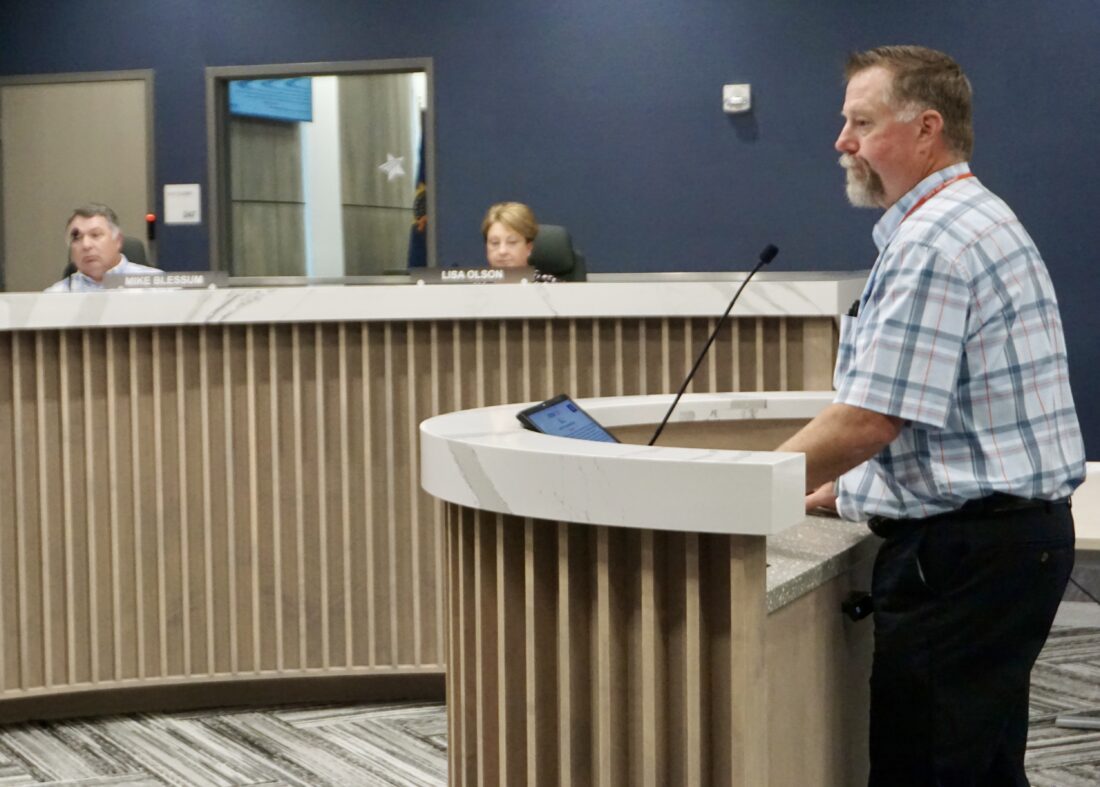City council stalemates over policy on cash reserves

City Finance Director David Lakefield addresses the Minot City Council during discussion on a cash reserves policy at Monday’s meeting. Jill Schramm/MDN
An effort to adopt a policy managing the size of the city’s cash reserves stalled at the Minot City Council meeting Monday.
The council voted 3-3 on a proposed policy that would have changed the limits for reserve amounts in the city’s general fund, voicing disagreements over how much money is enough.
For those who voted against the policy, the change wasn’t enough.
The proposed policy stated the city would strive to maintain a minimum unrestricted general fund balance equal to 30% of the subsequent year’s budgeted expenditures. If reduced below that amount, the city would have five years to replenish the fund. The city currently seeks to maintain about 25% of budgeted expenditures.
The policy stated the maximum fund balance would not exceed 75% of the next fiscal year’s appropriation, which is the current limit, as set in state law.
“That’s not imposing anything on Minot that is taking a step beyond for our citizens,” council member Mike Blessum said. “The way that I look at this is that we’re actually going to be collecting and holding on to more under this policy than before I even asked the question, and I think we owe the community more than that.”
Blessum had pressed for a change after the city’s reserves had exceeded 75% last year, and the council voted to bring down the cash on hand by lowering property taxes.
“We’re not here to make money. We’re here to break even and provide the best service we can,” Blessum said. “That’s why, to me, it’s important that we pull back on what these reserves look like, keeping in mind, again, if you remember, during the budget process, I pointed out that we were actually over what Century Code allowed us. The finance team has done a nice job of rectifying that, making sure that we’re on the right side of that, but I think we need to take a step further.”
He proposed instead that reserves be limited to a range of 30-50% of the operating budget. His motion to amend failed on a tie vote before the policy also failed.
Blessum was joined in support of the amendment and opposition to the proposed policy by council members Rob Fuller and Scott Samuelson. Council members Mark Jantzer, Lisa Olson and Paul Pitner took the other side.
“The reason I support this policy is it does give us flexibility, but it still does put the authority and decision making in our hands. I don’t want to keep that number so low that when we have to make a decision related to some financial need, that our hands are tied,” council member Lisa Olson said. “I want to keep taxes as affordable as possible. But we also know that we are the financial stewards for the city, and we have decisions that need to be made, and sometimes we just need that little extra.”
City Finance Director David Lakefield said the city ended 2024 at about 50% of operating costs, but he added the city also is looking at expenses such as a remodel of the police station, estimated at $17 million, or more than half of the amount in reserves in the general fund. He said the city should look at long range demands and set money aside rather than have peaks and valleys in revenue collections to cover costs over the short term.
Blessum said that strategy turns the conversation from figuring out how to raise money to figuring out how to spend it.
“Instead of that turning out to be $17 million, maybe we find a solution that’s closer to $7 or $8 or $9 million,” he said of the police station. “It’s important to start drawing this back. It’s going to make our decisions tougher, but that’s the point.”
“We’re carrying between $30 million and $40 million in unrestricted funds already in our general fund. How much more of the people’s money do we need to sit in there?” Fuller said. “The amount of money that we hold should be on par with what we want to do next year, not what we want to do in 10-15 years.”
Samuelson said the city can remodel the police station for half of the money proposed. The more money that gets collected, the more money that is spent, he said.
“So, we’re going to get the biggest and the best. I’m not saying that we shouldn’t have the best, but we should live within our means like the citizens of Minot do all the time,” Samuelson said.
In light of the failure to agree on a policy, Blessum urged the council to return excess reserves to the taxpayers going forward.
“When we over collect, which we have done consistently – I think seven years in a row ,” he said, “we immediately return that the next year.
“I’m fine with that,” Pitner responded. He said the city had taken more than needed, but the dollars not returned were put to work on needed projects such as road maintenance. With city staff continuing to manage the city’s money well as they have been, he said, “We’ll go back to business as usual.”




